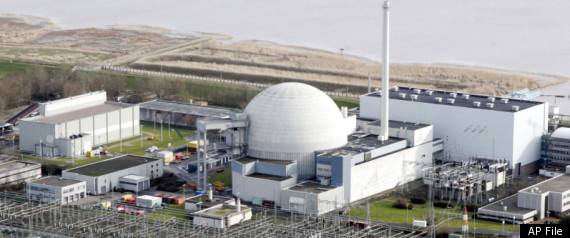
German lawmakers overwhelmingly approved on Thursday plans to shut the country's nuclear plants by 2022, putting Europe's biggest economy on the road to an ambitious build-up of renewable energy.
The lower house of parliament voted 513-79 for the shutdown plan drawn up by Chancellor Angela Merkel's government after Japan's post-earthquake nuclear disaster. Most of the opposition voted in favor; eight lawmakers abstained.
Lawmakers sealed for good the shutdown of eight of the older reactors, which have been off the grid since March. Germany's remaining nine reactors will be shut down in stages by the end of 2022.
By 2020, Germany wants to double the share of energy stemming from water, wind, sun or biogas to at least 35 percent. Until this year, nuclear energy accounted for a bit less than a quarter of Germany's power supply.
"Some people abroad ask: will Germany manage this? Can it be done? It is the first time that a major industrial country has declared itself ready to carry through this technological and economic revolution," Environment Minister Norbert Roettgen told lawmakers.
"The message from today is this: the Germans are getting to work," he said. "This will be good for our country, because we all stand together. So let's get to work."
The government hasn't put a specific price tag on the plan to shift to renewable sources.
"Of course it will cost something, but it won't overburden anyone," Roettgen said.
Thursday's vote completed a spectacular about-face on nuclear energy by Merkel's center-right coalition. Only last year, it had amended a previous center-left government's plan to abandon nuclear power by the early 2020s and extended the life span of Germany's 17 reactors by an average 12 years.
After Japan's Fukushima Dai-ichi plant was ravaged by an earthquake and tsunami, Merkel said the accident had prompted her to reevaluate the risks of nuclear power.
Opposition leaders taunted the government over its U-turn, which Merkel initiated less than two weeks before a pair of state elections in March.
"We are approving this out of full conviction, but you are doing it merely to preserve power," said Sigmar Gabriel, the head of the center-left Social Democrats.
Renate Kuenast, the co-leader of the Greens' parliamentary group, said she didn't care why Merkel had changed course.
"For me, it's enough of a historical irony that you now have to come close to what you fought for decades," she said.
"Now no one can deny that Germany wants an energy turnaround," added Kuenast. Her party has always opposed nuclear energy, which has been unpopular in Germany since the 1986 Chernobyl disaster sent radioactivity drifting over the country.
Still, she complained that the government's renewable energy target was "unambitious," arguing that Germany should be aiming for a share of well over 40 percent.
"The world is watching us now, and we will have to do justice to that," Kuenast said. "That is the scale of this task: We must show that this works for the (world's) fourth-biggest industrial country."
Parliament's upper house, which represents Germany's 16 states, is expected to endorse the plans next week, but much of the package doesn't formally require its approval.
Article courtesy of huffingtonpost.com

